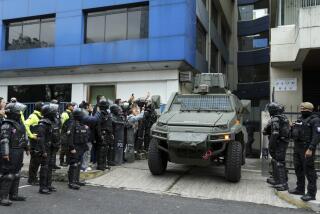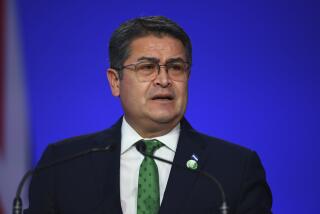Honduras president and advisors targeted by DEA investigation
U.S. federal court documents show that Honduran President Juan Orlando Hernandez and some of his closest advisors were among the targets of a U.S. Drug Enforcement Administration investigation.
A document filed by prosecutors Tuesday in the Southern District of New York mentions Hernandez as part of a group of individuals investigated by the DEA since about 2013 for participating “in large-scale drug-trafficking and money laundering activities relating to the importation of cocaine into the United States.”
Hernandez was elected president of Honduras in late 2013.
The document is a July 2015 application to the court to compel Apple, Google, Microsoft, Yahoo and AOL to give investigators email header information, but not emails’ content, for a number of accounts. Two of the accounts are believed to belong to Hernandez, the documents says.
There is no indication charges have been brought against the president.
Also included in the request are the email accounts of the president’s sister Hilda Hernandez, his advisor Ebal Díaz and his security minister Julian Pacheco Tinoco. Hilda Hernandez, who helped manage the finances of the president’s political party and his presidential campaign, died in a December 2015 helicopter crash. The request also named four members of the wealthy and politically connected Rosenthal family.
Yani Rosenthal, a former national lawmaker and presidential candidate, pleaded guilty in U.S. federal court in 2017 to money laundering for the Cachiros drug trafficking organization.
The new court filing is part of the pretrial motions in the case of Hernandez’s brother Juan Antonio “Tony” Hernandez, who was arrested in 2018 in Miami and accused of scheming for years to bring tons of cocaine into the country. His trial is expected to start in September.
A spokesman for the Southern District of New York said Thursday that the court’s response to the application for email header data is not public information. He declined to comment further.
The document filed Tuesday raises the possibility that the DEA has email data for Honduras’ president and members of his inner circle dating to 2015.
Messages left for Díaz, who is Hernandez’s de facto spokesman, were not immediately returned. Pacheco could not be immediately reached, but the government has previously denied allegations against him.
Pacheco has been dogged by allegations of his links to drug traffickers since at least 2017 when a leader of Honduras’ Cachiros cartel testified in another case in New York about his ties to drug traffickers.
Pacheco had served under Hernandez’s predecessor, Porfirio “Pepe” Lobo Sosa, as the government’s chief of investigation and intelligence. Lobo’s son Fabio was sentenced to 24 years in a U.S. prison in 2017 for drug trafficking.
In another document filed Tuesday in Tony Hernandez’s case, prosecutors said, “The charges against the defendant arise out of a long-term investigation of politically connected drug trafficking in Honduras” that began in 2013.
On Thursday, a DEA spokeswoman referred questions to the Southern District of New York.
The U.S. government has been a staunch supporter of Hernandez’s government, pouring millions of dollars into security cooperation because Honduras is a key transshipment point for cocaine headed to the U.S. from South America.
Hernandez had especially curried favor with former Trump administration official John F. Kelly, who as a Marine general had led the U.S. military’s Southern Command. Kelly, who served as President Trump’s Homeland Security secretary and then as his chief of staff, advocated for continued U.S. support of Hernandez’s government, noting its contributions to the war on drugs and progress in combating corruption.
When Hernandez’s already controversial reelection was tainted by irregularities in late 2017, the U.S. government congratulated him while the opposition was still contesting the vote count.
With Hondurans filling the ranks of several large migrant caravans through Mexico during the last year, the U.S. has continued to support Hernandez while pressuring his government to stem the immigration flow.
Many Honduran migrants encountered while making the journey to the U.S. border during the last year have referenced government corruption among their reasons for leaving. Thousands of doctors and teachers have been marching through the streets of Honduras’ capital for three weeks against presidential decrees they say would lead to massive public sector layoffs. On Thursday, a vast march led to clashes with police who fired tear gas after some protesters threw rocks.
Retired history professor Dana Frank, whose recent book “The Long Honduran Night: Resistance, Terror, and the United States in the Aftermath of the Coup” details the country’s recent political turmoil, said the documents confirm the U.S. government has known about drug trafficking activities linked to Hernandez for years.
“Why have U.S. officials — from the State Department to the White House to the Southern Command — continued for years now to celebrate, and pour security funding into, a government whose very topmost officials and security figures it has known were drug traffickers?” Frank said. “This evidence underscores the vast hypocrisy of U.S. policy, which backs a known drug trafficker and his police and military cronies, while claiming to do so in the name of fighting crime and drugs.”
More to Read
Start your day right
Sign up for Essential California for news, features and recommendations from the L.A. Times and beyond in your inbox six days a week.
You may occasionally receive promotional content from the Los Angeles Times.






